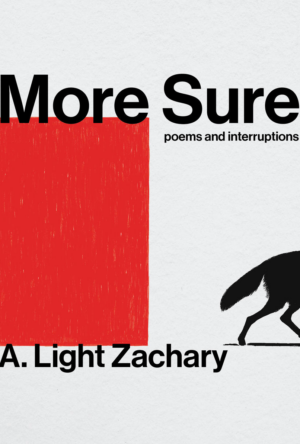More Sure
by A. Light Zachary
reviewed by Jeffrey Careyva
A. Light Zachary’s poetry collection More Sure is a debut that dwells in indeterminacy and basks in multitudes. From recontextualizing ancient texts to embracing the fact that we’re all a hot quantum-entangled mess, these poems offer joy and prudence in equal measure. Zachary seamlessly weaves together eclectic references to Plato’s Cratylus, theoretical physics, Jos Charles’s poetry, and life-simulation games, scavenging the past to build a home for a queer, neurodivergent existence in the present. Reading this collection is like discovering classified research on how to forge a new life for yourself.
“God particles” blasts open the collection with an invocation of hope in the end times:
Hope and no more asking.
Let the fabric of the known
tear beyond mending.
Let it all collapse
into what we, here, comprise.
Split skies, as the world
ends, begins again:
calm on the horizon,
thunder on the wing.
With these thundering end-stops, Zachary emphasizes from the start that it’s not the time to ask nicely for what we want. If things feel scary, it’s because things are scary for trans and non-binary people. Zachary sees potential in the ruins of old idols and ideals, in breaking open what we thought we knew and seeing what’s inside. Even as the sky splits there is a kind of assurance in the caesura between one ending and another beginning.
There is nothing fatalistic about the poetry of More Sure. Instead, Zachary flourishes in uncertainty, “outdance[s] epistemology,” and resists categorization. Boxes can be helpful, but these poems read as if Schrödinger’s cat refused ever to get inside. Being more of a dog person, Zachary finds a spirit animal in the wily coyote: wandering where someone says they shouldn’t and making the leaders of homeowners’ associations shake in their boots. As they remind us in the closing poem, “The coyote speaks”:
Deliberate
is
life
in the refusal
to starve,
the refusal
to be preyed
upon
Throughout the collection, Zachary’s language vacillates between sounding prophetic, erotic, funny, reflective, confident, and receptive. Take, for example, “All ten parts,” which alludes to Tiresias’s legendary conundrum of deciding which sex receives more pleasure:
For all our oppressors may keep from our reach, they will never know what it is to ———————— so decadently as we do. They already hate us for this freedom they can’t eat; they might slay us all if they knew how ———— it can be to embody confluence, incarnate possibility. Come, take it to the kitchens with me: trans sex is adding to your mother’s recipe until it’s your recipe … Come, sit on my face until you change its shape; let us make belief from what we were told was waste.
The redactions keep open the possibilities for desire, expression, identification, and connection. Suggestively borrowing from the past, Zachary offers “interruptions” of the classics, finding possibility in the lacunae and making these revered texts meet our current needs—to laugh, to hold accountable, to wonder, to experiment. Knowledge is a process, not a product, and the “I” and “we” of these poems are substantial yet elusive, like quantum particles (or Tiresias’s gender). Every time you look, they are somewhere else in the warped field of space-time.
Zachary’s humor and wit defy any stubborn sense of fidelity to the status quo. A poem like “Friday nights at the non-binary drive-in” doesn’t wait for Hollywood to produce the remakes we actually need, such as “A movie called Alien vs. Predator in which we go back in time / to fight everyone who hurt us when we were young.” One of my favorite short poems, entitled “Bumper sticker,” declares that “MY OTHER [gender] IS A FERRARI.”
Many lines from More Sure work as mantras of incessant reinvention. In “To recite each morning,” they write: “Undefine myself. / Unexplain myself. // Unjustify myself. / Unrationalize myself.” Zachary, however, refuses to indulge cis readers’ expectations for easily digestible accounts of non-binary people’s experiences. They opt instead to “write the poem about your fear of what it means that something like me can be better at this than you.”
Out of the chaos, More Sure emerges to show us the significance of kissing at basement parties and strutting to your favorite music. Nobody is sure of much of anything, but the charm of Zachary’s poetic voice is one thing you can count on.
Published on September 21, 2023

